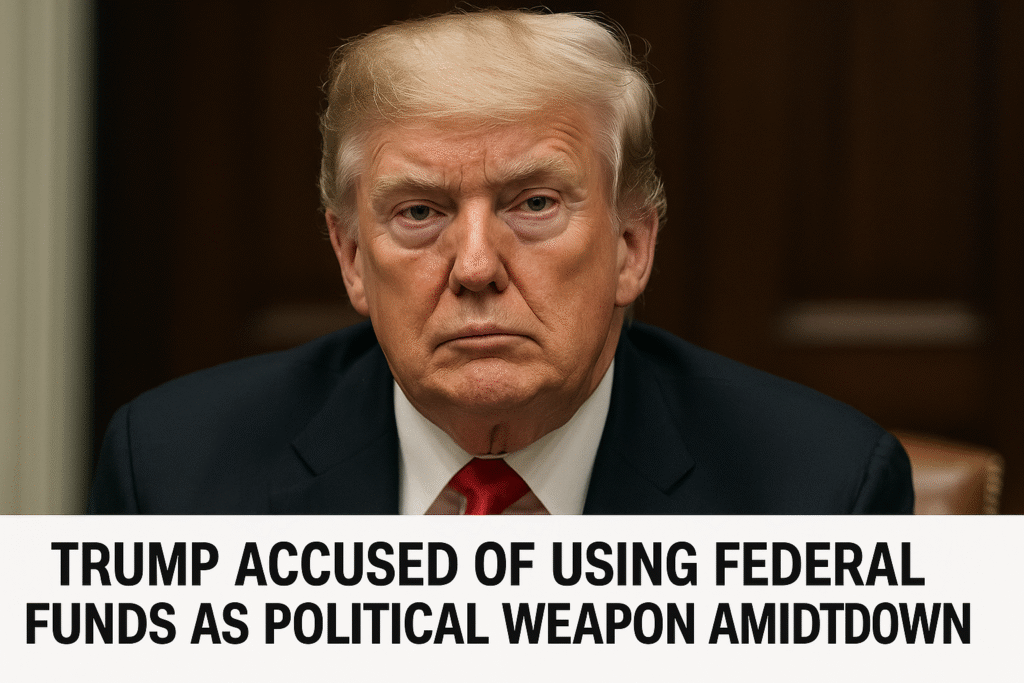By Harshit | October 8, 2025 | Washington, D.C.
Controversy Over Federal Funds
Washington — President Donald Trump’s management of federal funds during the ongoing government shutdown has triggered renewed debate, with critics alleging that he is treating taxpayer money as a political instrument rather than a public resource.
On Tuesday, Trump suggested that some furloughed federal workers may not receive back pay, a departure from precedent in previous shutdowns where all affected employees were eventually compensated. His remarks intensified concerns that federal funds are being selectively deployed to reward allies and punish political opponents.
Targeted Spending and Funding Freezes
Trump has been willing to allocate funds for initiatives aligned with his priorities, including tariff-related bailouts for U.S. farmers and support for international allies such as Argentina’s populist President Javier Milei. Conversely, funding has often been withheld from states, cities, and programs opposed by his administration.
During the current shutdown, approximately $18 billion in federal infrastructure funds for New York City were frozen, affecting projects like the Second Avenue subway extension and the Hudson River rail tunnels, both linked to senior congressional Democrats. In addition, nearly $8 billion earmarked for climate initiatives across 16 states, predominantly governed by Democrats, has been blocked.
Historical examples include Trump threatening to cut disaster relief for Puerto Rico and withholding federal grants from universities such as Harvard and Columbia over programs deemed “woke.” These patterns have amplified criticism of the administration’s approach to the shutdown.
Layoff Threats as Political Leverage
Trump has repeatedly raised the specter of federal layoffs, framing the government shutdown as a justification for firing workers. He even suggested that back pay could be selectively distributed, depending on political alignment.
“Some people really don’t deserve to be taken care of,” Trump said, emphasizing that military personnel would receive their pay. Legal analysts warn that such selective measures risk turning federal employment into a bargaining chip in political negotiations.
Constitutional and Legal Concerns
Critics argue the administration’s approach undermines the Constitution’s “power of the purse,” which vests Congress with authority over federal spending. White House press secretary Karoline Leavitt defended the targeting of agencies and programs considered misaligned with Trump’s priorities or “wasteful,” but legal experts contend that bypassing Congress raises serious constitutional questions.
“Judges have previously said that the administration cannot wrest control of spending away from Congress,” said legal analyst Chris Towner. Even attempts to use tariff revenue to fund federal programs during the shutdown have drawn scrutiny for circumventing congressional appropriations.
Leadership Style and Governance
Observers note that Trump’s handling of federal funds reflects a broader leadership style marked by strategic use of executive authority to pressure political opponents. Analysts highlight parallels with his first impeachment, which involved efforts to leverage U.S. foreign aid in dealings with Ukraine. Critics suggest that the current tactics during the domestic shutdown mirror that same approach, now applied to federal operations.
By selectively funding favored initiatives while freezing others, Trump’s administration appears to treat governance as a contest of political strength, raising concerns over the precedent it sets for future executive actions.
Political Fallout and Implications
As the shutdown enters its seventh day, Republicans hold a narrow 53-47 Senate majority, but eight Democratic votes are required to pass most funding measures. Negotiations remain stalled, and Trump’s threats regarding selective federal pay may further complicate prospects for compromise.
Essential government operations, including border security and air traffic control, continue to function, while numerous federal services remain suspended. Analysts warn that prolonging the standoff could have broader economic consequences, from delayed infrastructure projects to disruption in public programs.
The president’s approach underscores the unprecedented nature of his second-term administration and highlights the tension between executive ambition and constitutional limits on presidential authority. As the political stalemate continues, many are watching closely to see how far Trump will push federal funding as a tool to achieve his political objectives.

